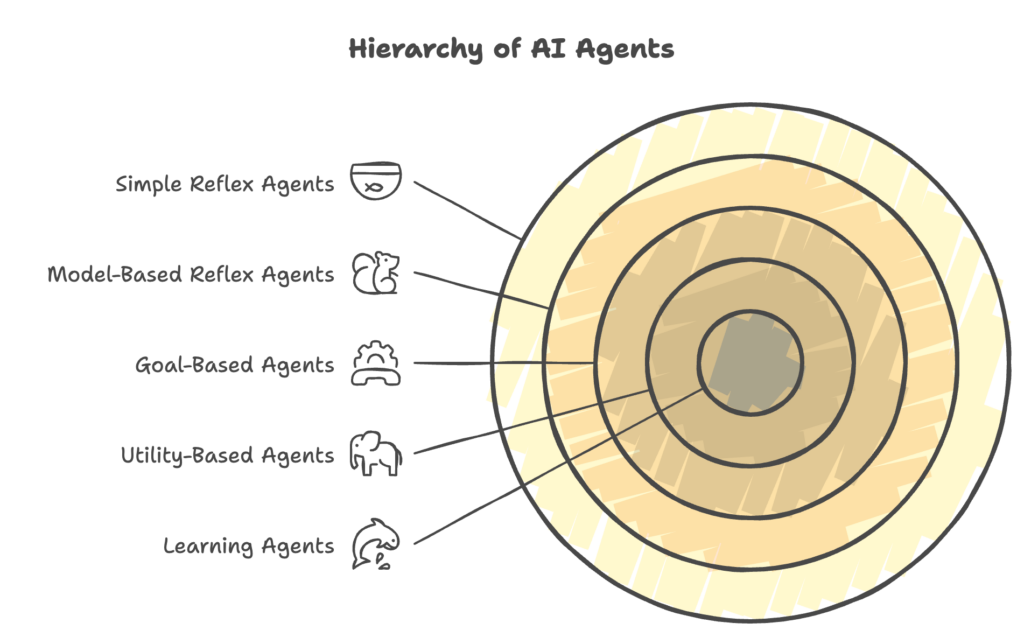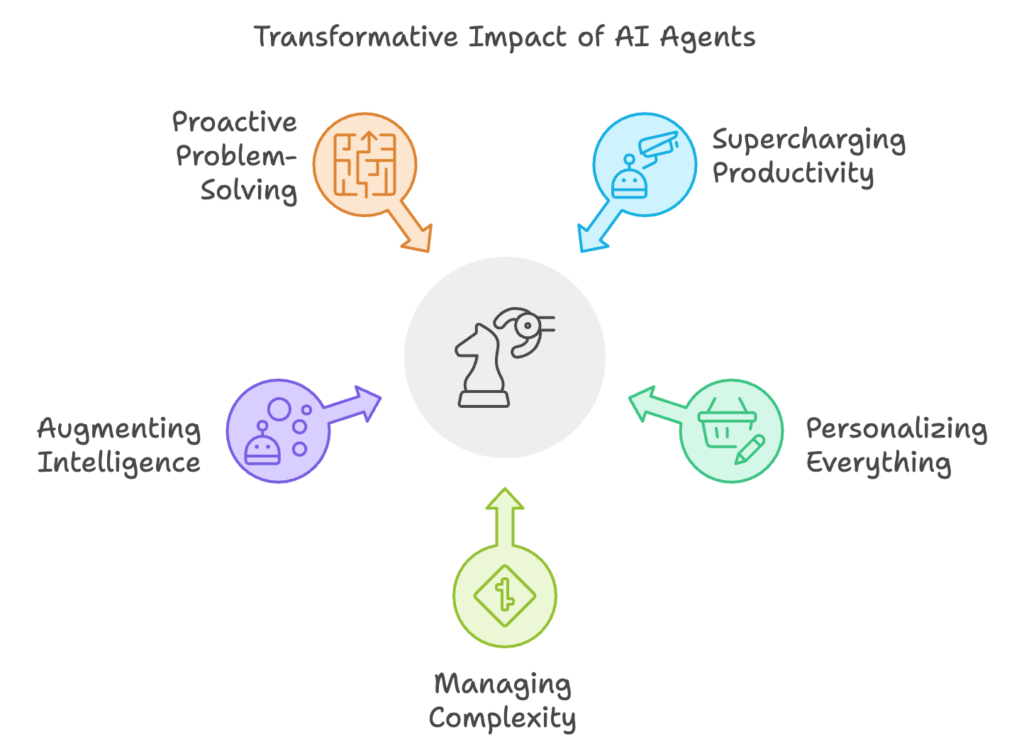Picture this: You’re sitting in your cozy living room, sipping a cup of coffee, when suddenly your smart home assistant pipes up
“Hey, I noticed you’re running low on coffee beans. I’ve taken the liberty of ordering your favorite blend, and it’ll be delivered tomorrow. Oh, and by the way, I’ve adjusted the thermostat to save energy while you’re out today, and I’ve scheduled your car for a maintenance check next week based on its performance data.”
Whoa, hold up. When did your digital assistant become so… proactive?
Welcome to the world of AI agents, my friends. It’s a place where artificial intelligence isn’t just responding to your commands but actively working on your behalf, making decisions, and getting stuff done. It’s like having a super-smart, tireless personal assistant who never sleeps, never complains, and is always looking out for your best interests.
But before we dive deeper into this brave new world, let’s take a step back and ask ourselves: What exactly are AI agents, and why should we care about them? Buckle up, because we’re about to embark on a journey that will make you see the future of technology in a whole new light.
What Are AI Agents?
At their core, AI agents are software programs designed to perceive their environment, make decisions, and take actions to achieve specific goals. Think of them as digital entities with a mission, armed with artificial intelligence to help them navigate the complex world of information and tasks.
But here’s where it gets interesting: AI agents aren’t just following a set of predefined rules. They’re learning, adapting, and evolving based on their experiences and the data they encounter. It’s like the difference between a GPS that simply follows a map and a futuristic navigation system that can anticipate traffic patterns, learn your preferences, and even suggest exciting detours based on your mood.
To really grasp the concept of AI agents, let’s break it down with an analogy:
Imagine you’re the coach of a soccer team. Your players are like traditional computer programs – they’re great at executing specific tasks when you tell them what to do.
You shout “Pass the ball!” and they pass.
You yell “Shoot!” and they shoot.
They’re efficient, but they need constant direction.
Now, imagine you have a star player who not only executes your instructions but also reads the game, anticipates opponents’ moves, creates opportunities, and makes split-second decisions on their own. That’s your AI agent. It’s not just waiting for commands; it’s actively playing the game, learning from each match, and constantly improving its performance.
Types of AI Agents: A Zoo of Digital Creatures
Just as the animal kingdom is filled with a diverse array of creatures, each adapted to its own niche, the world of AI agents is populated by various types, each with its own specialties and capabilities. Let’s take a tour of this digital zoo –
Simple Reflex Agents:
These are the goldfish of the AI world. They operate based on the current perception of their environment, without considering past experiences or future consequences. It’s like a thermostat that turns the heat on when it’s cold and off when it’s warm. Simple, but effective for basic tasks.
Model-Based Reflex Agents:
Think of these as the squirrels of AI – they have a simple internal model of how the world works. They can handle slightly more complex situations by considering how their actions might change the environment. It’s like a chess program that can think one or two moves ahead.
Goal-Based Agents:
Now we’re getting into the realm of problem-solving animals, like crows or octopuses. These agents have specific goals and can plan a sequence of actions to achieve them. Imagine a robot vacuum that not only cleans but also plans the most efficient route to cover your entire house.
Utility-Based Agents:
These are the wise old elephants of the AI world. They don’t just achieve goals; they try to achieve them in the best possible way. They weigh different options based on their potential outcomes and choose the one with the highest utility. It’s like having a financial advisor who doesn’t just save your money but optimizes your investments for the best possible returns.
Learning Agents
Here we have the true stars of the show – the dolphins or chimpanzees of AI. These agents can learn from their experiences and improve over time. They adapt to new situations and get better at their tasks the more they perform them. It’s like having an assistant who not only manages your schedule but learns your preferences and habits, becoming more efficient and personalized over time.

Why Should You Care? The AI Agent Revolution
Now that we’ve got a handle on what AI agents are, let’s talk about why they’re such a big deal. Because, trust me, they’re about to change your life in ways you might not even imagine.
They’re Supercharging Productivity
Imagine having a tireless assistant who works 24/7, handling all the mundane tasks that eat up your time. AI agents are becoming incredibly adept at managing schedules, sorting emails, conducting research, and even writing reports. They’re not just saving time; they’re freeing up mental space for you to focus on what really matters.
Think about it this way: If your brain is a high-performance sports car, a lot of your daily tasks are like using that car to deliver groceries or commute in heavy traffic. AI agents are like having a fleet of efficient delivery drones and a personal rapid transit system. They handle the routine stuff, leaving your mental horsepower free for the tasks that really need it – creative thinking, complex problem-solving, and innovation.
They’re Personalizing Everything
We’re moving from a world of one-size-fits-all to a world where everything can be tailored just for you. AI agents are at the forefront of this personalization revolution. They’re analyzing your preferences, habits, and needs to create experiences that feel like they were designed just for you.
Imagine a world where your news feed isn’t just a random collection of popular stories, but a carefully curated selection of articles that align with your interests, challenge your perspectives, and help you grow. Or a shopping experience where you don’t have to wade through thousands of options, but are presented with a handful of choices that perfectly match your style, budget, and needs.
It’s like having a friend who knows you better than you know yourself, always looking out for your best interests and helping you discover new things you’ll love.
They’re Making Complex Systems Manageable
Our world is becoming increasingly complex, with interconnected systems that are often too intricate for any one person to fully grasp. AI agents are becoming crucial in managing and optimizing these systems.
Think about urban traffic management, for instance. An AI agent can analyze real-time data from thousands of sensors, predict traffic patterns, adjust signal timings, and even coordinate with navigation apps to reduce congestion. It’s like having a super-intelligent traffic cop who can see the entire city at once and make split-second decisions to keep everything flowing smoothly.
Or consider energy grids. AI agents can balance supply and demand, integrate renewable sources, predict maintenance needs, and even negotiate with other grids to ensure a stable, efficient power supply. It’s like having a team of expert engineers monitoring every aspect of the grid 24/7, but with the ability to process information and make decisions at superhuman speeds.
They’re Augmenting Human Intelligence
Here’s where things get really exciting. AI agents aren’t just tools; they’re partners that can augment and enhance human intelligence in remarkable ways. They’re like cognitive prosthetics, extending our mental capabilities far beyond their natural limits.
Imagine you’re a doctor trying to diagnose a complex case. An AI agent can instantly analyze the patient’s symptoms, medical history, and latest research to suggest potential diagnoses and treatment options you might not have considered. It’s not replacing your medical expertise; it’s enhancing it, giving you superpowers to see patterns and connections that might be invisible to the naked eye.
Or picture yourself as a scientist working on climate models. An AI agent can help you process vast amounts of data, test hypotheses, and even suggest novel approaches based on its analysis of thousands of research papers. It’s like having a lab full of brilliant assistants, each with perfect recall and the ability to work tirelessly on your project.
They’re Solving Problems We Didn’t Even Know We Had
One of the most fascinating aspects of AI agents is their ability to identify and solve problems that we humans might not even be aware of. They can analyze vast amounts of data to spot trends, anomalies, and opportunities that would be invisible to us.
For example, an AI agent managing a supply chain might notice subtle patterns in order data that suggest an upcoming shortage of a critical component. It could then proactively adjust orders, find alternative suppliers, or even suggest product redesigns to mitigate the risk – all before a human manager would even realize there was a potential problem.
It’s like having a crystal ball that not only predicts the future but also gives you actionable steps to shape that future to your advantage.

The Challenges: It’s Not All Rainbows and Unicorns
Now, before you start planning your early retirement, thinking AI agents will take care of everything, let’s pump the brakes a bit. Like any powerful technology, AI agents come with their own set of challenges and potential pitfalls.
The Black Box Problem
Many AI agents, especially those based on complex neural networks, operate in ways that can be difficult or impossible for humans to understand. This “black box” nature can be problematic when we need to audit decisions or understand why an agent took a particular action.
Imagine an AI agent managing your investment portfolio. It might make decisions that seem counterintuitive or even wrong to you. If you can’t understand the reasoning behind these decisions, how can you trust your financial future to this digital entity?
Ethical Dilemmas
As AI agents become more autonomous and influential, they’ll increasingly face situations with ethical implications. How do we ensure they make decisions aligned with human values and ethical principles?
Consider an AI agent managing a city’s resources during a natural disaster. How should it prioritize rescue efforts? Based purely on the number of lives that can be saved, or should it consider factors like age, social impact, or long-term survival chances? These are complex ethical questions that we’re still grappling with as humans.
Privacy and Security Concerns
To be effective, AI agents often need access to vast amounts of data, including personal information. This raises serious questions about privacy and data security. How do we balance the benefits of personalized AI agents with the need to protect individual privacy?
It’s like inviting an incredibly smart, helpful stranger to live in your home. Sure, they might make your life easier, but how much of your personal information are you comfortable sharing with them?
Job Displacement
As AI agents become more capable, they’ll inevitably take over many tasks currently performed by humans. While this can lead to increased productivity and new types of jobs, it also means significant disruption to the job market.
Imagine you’re a truck driver, and suddenly AI agents are capable of safely operating vehicles 24/7 without breaks. Or you’re a paralegal, and an AI agent can now review contracts faster and more accurately than any human. How do we as a society handle this transition?
Dependency and Skill Atrophy
As we rely more on AI agents, there’s a risk of becoming overly dependent on them, potentially leading to atrophy of certain human skills. If an AI agent always optimizes your schedule, will you lose the ability to manage your time effectively? If it always suggests the best route, will your natural sense of direction deteriorate?
It’s like always using a calculator instead of doing mental math. Sure, it’s more efficient, but are we losing something valuable in the process?
The Road Ahead: Embracing the AI Agent Revolution
Despite these challenges, the potential benefits of AI agents are too significant to ignore. So, how do we move forward? How do we harness the power of AI agents while mitigating the risks?
- Invest in AI Literacy: Just as we teach kids to read and write, we need to educate ourselves and future generations about AI. Understanding how AI agents work, their capabilities, and their limitations will be crucial for everyone, not just tech specialists.
- Develop Robust Ethical Frameworks: We need to work on creating clear ethical guidelines for AI development and deployment. This isn’t just a job for philosophers and ethicists – it needs input from diverse voices across society.
- Prioritize Transparency and Explainability: We should push for AI systems that can explain their decisions in ways humans can understand. This “explainable AI” will be crucial for building trust and ensuring accountability.
- Focus on Human-AI Collaboration: Instead of thinking about AI agents as replacements for humans, we should focus on how they can augment and enhance human capabilities. The goal should be to create synergies between human intuition and creativity and AI’s processing power and pattern recognition.
- Adapt Our Education and Training Systems: As AI agents take over more routine tasks, we need to shift our education systems to focus more on uniquely human skills like creativity, emotional intelligence, and complex problem-solving.
- Implement Strong Data Protection Measures: As AI agents become more integrated into our lives, robust data protection measures will be crucial to safeguard privacy and prevent misuse of personal information.
- Plan for Economic Transitions: We need to start planning now for the economic shifts that widespread AI adoption will bring. This might include ideas like universal basic income, lifelong learning programs, or new economic models that aren’t solely based on human labor.
ChatCube: Your Personal AI Agent Factory
Alright, folks, buckle up because we’re about to dive into something that’s going to make your brain explode (in a good way, I promise). Remember how we talked about AI agents being like super-smart personal assistants? Well, what if I told you there’s a tool out there that lets you create your own army of these digital helpers, custom-tailored to your business, faster than you can say “artificial intelligence”? Enter ChatCube, the Willy Wonka’s factory of the AI world.
Picture this: You’re a business owner, drowning in a sea of customer inquiries, desperately trying to keep your head above water while also attempting to reel in new customers. It’s like trying to juggle flaming torches while riding a unicycle on a tightrope. Over a shark tank. In a hurricane. Fun times, right?
Now, imagine having a team of tireless, infinitely patient, incredibly knowledgeable assistants who can handle all those customer questions and even generate leads for you. Sounds like a dream, doesn’t it? Well, pinch yourself, because ChatCube is making that dream a reality.
ChatCube lets you create custom ChatGPT-like chatbots for your business, trained on your own data. It’s like having your very own mini-ChatGPT, but instead of knowing a little bit about everything, it knows everything about your business. And the best part? You don’t need to be some coding wizard or AI genius to set it up. They claim it takes less than 5 minutes, and for once, that’s not an exaggeration. It’s so easy, you could probably do it while waiting for your coffee to brew.
These ChatCube-created AI agents are like the Swiss Army knives of the digital world. They can handle customer support questions, firing off answers faster than a caffeinated cheetah. Need help generating leads? These AI agents are like digital bloodhounds, sniffing out potential customers and guiding them right to your virtual doorstep.
But here’s the really cool part: when your AI agent isn’t sure about something, it doesn’t just make stuff up. Instead, it does something revolutionary: it admits it doesn’t know and hands off to a human agent. It’s like having an intern who actually tells you when they’re out of their depth instead of accidentally setting the office on fire. Revolutionary, I know.
And if your business is constantly evolving? No problem. Retraining your AI agent with new content is easier than convincing yourself you’ll actually use that gym membership. It’s literally a one-click process. You add new content, click a button, and boom – your AI agent is up to date faster than you can say “digital transformation”.
With tools like ChatCube, we’re not just watching the AI agent revolution – we’re actively participating in it. We’re shaping it, molding it to fit our needs, our businesses, our goals. It’s like being handed the keys to the future and being told, “Here, you drive for a while.”
So, whether you’re a small business owner drowning in emails or a large corporation looking to streamline customer service, ChatCube and the world of custom AI agents are definitely something to keep on your radar. Because let’s face it, in the race to the future, wouldn’t you rather be in the driver’s seat than watching from the sidelines?
Conclusion: The AI Agent Revolution is Here – Are You Ready?
AI agents are not some far-off future technology. They’re here, now, and they’re evolving rapidly. From the digital assistants on our phones to the algorithms managing our social media feeds, AI agents are already shaping our daily lives in myriad ways.
The question isn’t whether AI agents will become a significant force in our world – they already are. The real question is how we choose to shape and direct this technology. Will we harness it to augment human capabilities, solve global challenges, and create a more efficient, personalized world? Or will we let it develop haphazardly, potentially exacerbating existing inequalities and creating new problems?
The choice is ours. By understanding AI agents, engaging with the challenges they present, and actively participating in shaping their development, we can help steer this technology towards outcomes that benefit humanity as a whole.
So, the next time your digital assistant offers to order your groceries or your email client automatically sorts your messages, take a moment to appreciate the AI agent at work. But don’t stop there. Start thinking about how these technologies might evolve, how they might change your job, your industry, your life. Because ready or not, the AI agent revolution is here. And it’s up to all of us to make sure it’s a revolution for the better.
Remember, in the world of AI agents, we’re not just users – we’re partners, guides, and ultimately, the ones who decide what kind of future we want to create. So, are you ready to play your part in shaping the AI agent revolution? The future is waiting, and it’s going to be wild ride!
What does an AI agent do?
An AI agent perceives its environment, makes decisions, and takes actions to achieve specific goals. It can automate tasks, process data, and interact with users or other systems autonomously.
What are the 5 types of agent in AI?
The five main types of AI agents are:
1. Simple Reflex Agents
2. Model-Based Reflex Agents
3. Goal-Based Agents
4. Utility-Based Agents
5. Learning Agents
What is an AI agent in real life examples?
Real-life examples of AI agents include:
1. Virtual assistants
2. Chatbots for customer service like ChatCube
3. Recommendation systems on streaming platforms
4. Autonomous vehicles
5. AI-powered trading algorithms in finance
How many AI agents are there?
There’s no fixed number of AI agents as new ones are constantly being developed. They range from simple task-specific bots to complex, multi-purpose systems. The number is growing rapidly with advancements in AI technology.
What are the main four rules for an AI agent?
The four main rules for an AI agent are:
1. Perceive the environment accurately
2. Process information and make decisions
3. Take actions to achieve goals
4. Learn and adapt from experiences to improve performance





